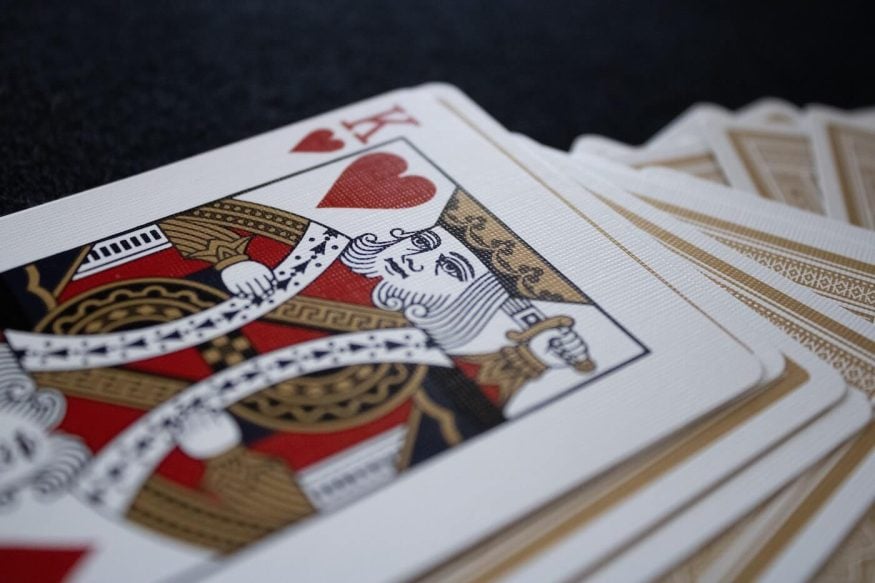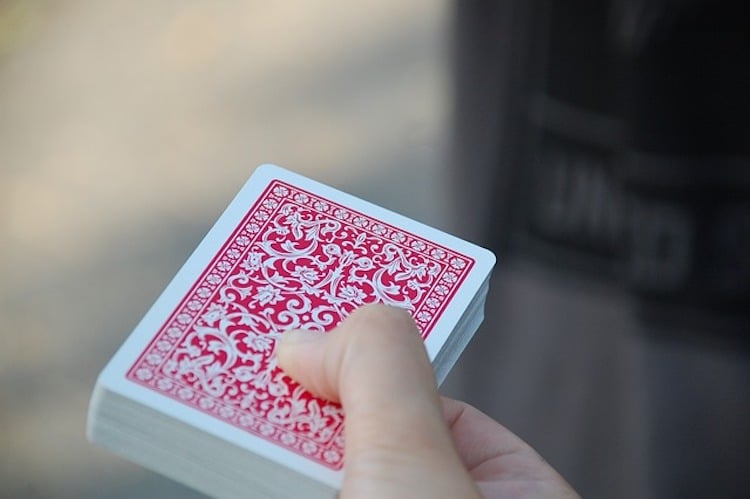R. Paul Wilson On: Tonk, The Fast-Moving Game For Gamblers

A friend and I recently reflected on the number of games that exist with playing cards and how many of those we had never heard of.
Hoyle’s famous book of rules for many card games is far from comprehensive and there are games developed and played in scenarios most of us would rather not find ourselves.
One such game is “Tonk” (or “Tunk”), a fast-moving game for gamblers that deserves your consideration.
How Does It Play?
The secret to a good game is not in the rules but in the way it plays and how it engages the player.
The more addicting and fun a game is – and the easier it is to learn – the more it will be played and when played for money, the more opportunities will exist for cheating or advantage play.
Rummy 500 and its variations is a good example of games that – once learned – can be quite addicting whether played for money or not.
Tonk is similar in how it plays (without the running count across multiple rounds) but is played faster and has been fine-tuned as a gambling game.
Rounds of play can be surprisingly quick with outcomes that can be expensive when doubling or even quadrupling opponents’ initial stakes based on house rules and circumstances.
Tonk Basics
Some rules vary and change according to location so consider this a very basic description of how to play.
The game is mostly played for money with each player putting an initial stake into the pot, but certain situations require players to add to that stake.
The game is a variation on Gin with each player receiving five cards (seven card and nine card variations also exist) with melds and runs being laid down (“spread’) until a player is out of cards.
Alternatively, a player can lay down their remaining cards whenever they believe they have the lowest number of points.
The goal is to get rid of all your cards or lay down the lowest total value.
When cards are spread by players, other players can “hit” those spreads with their own cards so if one player spreads three kings and another player has the fourth king, they can hit the other player’s spread, often with a financial or tactical penalty to the player being hit.
During play, cards are taken from the top of the discards or the unseen stock as each player takes their turn. Players can only spread cards of identical value or a run of cards (in order) of the same suit.
If a player lays down six cards (their five-card hand plus a card they picked) that’s a “Tonk” or “Tonking Out” and will cost their opponents a multiple of their initial stake.
If a player spreads only five cards and throws away the discard, they still win the hand but in most variations, this does not score double from the other players.
Variations Of Tonk
Tonk is a fast game that is open to many variations and house rules.
“Hitting” another player’s spread can result in that player having to sit out for a round of play or for multiple rounds if they are hit several times.
Getting hit could increase a player’s stake or cost an agreed amount each time the player is hit and, in some cases, the player being hit has the option to pay to play and avoid missing the next round!
Sounds complicated? It gets worse.
In some places, you can only hit a run and not three of a kind but the penalty for getting hit can be more severe.
Another house rule might be that if a player Tonks out (demanding double the stake from each of the other players) but their spread cards allow another player to also Tonk out, then both players (or just the second player to Tonk) win a “double-double” meaning players have to pay four times their initial stake!
Additionally, if your initial hand totals 50 points you can immediately “drop” and claim double stake from the other players and if someone else also has 50 you either share the pot or the second player can claim it instead!
As you can see, even if you know the game it can take a few rounds to understand what variations apply.
It’s all about where you play and with whom.
Big House Rules
Tonk (often pronounced “Tunk”) may be played in many scenarios, but it is particularly popular in the North American penal system where players spend many hours playing the game for whatever passes as money in that “establishment.”
It is from this backdrop that I first heard of the game from my late friend, Lew Brooks, and it was my assumption he either learned it from a friend who spent some time “away” or that Lew himself had spent a little time at the government’s pleasure.
Truthfully, I don’t know which for sure and would not presume to say Lew had ever been caught doing anything illegal.
Lew was a dealer in Las Vegas amongst other things and a well-known member of the local magic community who he regularly baffled with brilliant pieces of card magic and a few mathematical miracles, including a truly ingenious keno prediction that I can’t resist performing to this day if I find tickets at a Vegas restaurant table.
Lew was a big man, gruff on the outside but an absolute teddy bear underneath.
His demeanor belied a wealth of knowledge and a razor-sharp intellect that paid close attention to any situation and could recognize a weakness or advantage in a heartbeat.
Lew’s friend Frank Zak told me Lew also worked in Casino Security and that Tonk was often played in the break room by casino staff so I prefer to think that’s where he picked up the game, though given Lew’s personal history (he told me he once roomed with William S Burroughs) anything might be possible.
Like many of my friends from that period, his knowledge of the gaming industry, the games being played and the ways they could be beaten dwarfed my own.
Lew lived in the very heart of the gambling world with a foot on both sides of the table but his eyes really lit up when he talked about how a game could be beaten.
Lew was a wealth of information but getting that information sometimes meant running a minefield of questions and challenges; Lew liked to toy with people a little and make them work for the knowledge that took him decades to obtain.
Yet to a few, he was generous with his ideas and eager to share his findings – especially with the game of Tonk.

The Brooks Advantage
Wherever it was that Lew stumbled onto the game, he quickly recognized it as susceptible to a mathematical strategy and set about analyzing the game, quickly realizing Tonk was rich pickings for smart players.
For example, “dropping” your hand at the beginning of play was a strong move if your hand had a certain number of points (or less) and Lew found he could clean up by dropping as soon as he received a low value hand and had a few ways to “encourage” that situation that were more sleight than strategy.
Lew wrote tables of possible outcomes and situations based on multiple versions of the game, each dictating the best decision or action and the best way to avoid penalties to give Lew – or anyone who had his method – the best chance of a win.
Lew was convinced he had the game beat and over time would always come out on top, but the problem was: What to do with this system?
The game is hardly common and getting sentenced to five years just so you can be the greatest Tonk player in cell block B is hardly a good strategic move.
Lew worked on a book but it was never published and may be in the hands of friends or family who received his library and notebooks after he passed away.
But would Lew’s book have killed the game of Tonk before it could become popular enough to be worthwhile?
Who would want to play a game that can be beaten with a little knowledge and absolutely destroyed with a modicum of (crooked) skill?
The answer is no, Lew’s book would not have had any impact on the game itself unless his system became so widely used that it dictated changes to the rules or made the game too easy to win (or lose).
Buried Treasures
Many games have been “beaten” to some degree or other and whether they need a Quantum Computer to play perfect strategy or for players to memorize a few statistics, there are plenty of people who will never consider or care about systems or methods that might give them an advantage.
Gamblers like to play and love to gamble and they are the vast majority of players.
If this game ever did take off (and I hope it does), Lew’s work may become a lost treasure worth thousands to those who can obtain a copy.
I always wonder how many other Lew Brooks are out there and how many other games have been beaten in theory and are only waiting for someone to put that theory into practice.
One important lesson is to realize that while you may play any kind of game for fun, if money is on the table there’s always a chance you might one day be swimming with a shark.
Lead image: Crystal Berdion/Unsplash


